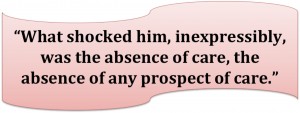We science-medicine-poetry junkies, along with a sizeable portion of the world’s population, are mourning the death of Oliver Sacks, the neurologist and author who died last Sunday from metastasized melanoma. And as enthusiasts of Dr. Sacks’ catechisms on the soul of the patient, we turn to his own words of mourning, written over 40 years ago for his close friend, the poet WH Auden:
Wystan’s departure affected me like a sudden darkness, the eclipse of all light and reality from the world. I knew him to be a man mortally ailing, and when he left [the U.S.] I mourned his death in advance. I suddenly realized what I had never properly avowed before, that he had been a beacon for me, a reality-bearer, so that his departure subtracted reality from my world… and there is a Wystan-shaped space which will never be filled.

Being a New Yorker, I had the great fortune of hearing him speak several times, and to commingle with him at Cornelia Street Café in the Village, where the wonderful cultural series Entertaining Science took root over 15 years ago.
The opening paragraph of Michiko Kakutani’s New York Times essay “Oliver Sacks: Casting Light on the Interconnectedness of Life” wonderfully elucidates the gift of this renaissance medicine man:
It’s no coincidence that so many of the qualities that made Oliver Sacks such a brilliant writer are the same qualities that made him an ideal doctor: keen powers of observation and a devotion to detail, deep reservoirs of sympathy, and an intuitive understanding of the fathomless mysteries of the human brain and the intricate connections between the body and the mind.
 Indeed, as quoted in Salon’s fine tribute, Sacks nails the ‘patient-centric’ medical practice by invoking Dr. William Osler’s 75-character maxim: “Ask not what disease the person has, but rather what person the disease has.”
Indeed, as quoted in Salon’s fine tribute, Sacks nails the ‘patient-centric’ medical practice by invoking Dr. William Osler’s 75-character maxim: “Ask not what disease the person has, but rather what person the disease has.”
Sacks’ remembrance of Auden, quoted above, was published in a 1975 compilation of tributes edited by Stephen Spender, long out of print. The essay is remarkable because it captures the spirit of “medical humanities” – a field amplified by Sacks when he joined Columbia University Medical Center in 2007. As described in the PR upon his hiring, “Sacks becomes a one-man embodiment of the multidisciplinary scholarship that has been a priority of Columbia President Lee C. Bollinger… this exemplifies the University’s effort to bridge the gap between the study of neuroscience and other disciplines in which scholars work to understand human behavior, including economics, social science, law and the arts.”
That embodiment is crystallized in the tribute to Auden, with invocations of psychology, poetry, sociology, storytelling, medicine and more. And those very qualities that he so adoringly attributes to Auden can be transcribed to Sacks’ own obituary, as excerpted below.
I will quote freely from the essay’s passages on the medical profession, because the text is sadly unavailable on the Web (at least based on my brief searches). This audience will require no further commentary on how Sacks’ musings pertain to our best hopes for care and respect from physicians.
Speaking of the start of their friendship, founded on a shared passion for music:
It was, amongst other things, Wystan’s musical sense which brought us together, and which formed a constant, tacit bond between us. In his review of my Migraine, and again in the last letter he ever wrote to me, Wystan quoted an aphorism of Novalis: ‘Every sickness is a musical problem, and every cure a musical solution’… in my reply I wrote ‘Yes, I agree, I feel, absolutely with Novalis… My medical sense is a musical one. I diagnose by the feeling of discordancy, or some peculiarity of harmony.
And just as Sacks’ parents were physicians,
Auden was himself the son of a physician, and carried within himself, as part of his patrimony, a deep love and understanding of doctors and medicine – he would, I am sure, have been one of our greatest physicians, had he not felt ‘elected’ or ‘ordained’ (favorite words!)…for the richer destiny of a poet and genius. He had the analytic brilliance and vigour of a physical scientist; he had an intuitive penetrating, almost clairvoyant sense of what was going on in people, physically and spiritually, what was amiss and what was aright; and in addition to these attributes of genius, he was a homely, cosy (though never nosey) old body… of a sort whom everyone confides in and trusts; the very image of a wise and decent, old-fashioned GP.
The amalgamation of accuracy and affection, knowing what is proper and loving what is dear – this is the essence of care, be it medical care, or any other sort of care; care for the body, care for the soul, care for the individual, care for Society, were almost inseparable in Auden’s mind. God, for him was no mere geometer high in the sky, but the cardinal principle of decency and care. It was essential for Wystan that there should be people to care for his needs, in whose skill and goodness he could repose entire faith. He required this, as we all require this, if we are to survive physically, existentially, and to enjoy decent health.
On the rapid decline of Auden’s health in his mid 60s, which led to his return to England after 34 years’ residence in the NYC:
When [his longtime physician] was alive, Wystan was well and lovingly taken care of, protected from ‘…the sadist, the nod-crafty, and the fee-conscious’ and from ‘…medical engineers with their arrogance’. With Dr. Protetch’s death, there occurred a grave and tragic change in Wystan’s situation: he had lost his own doctor, and could find no one to replace him. Why? Because decent, kindly, general practitioners are all but extinct in the U.S. today, and because the ancient art of healing is itself almost dead…. He faced ‘specialists’ with whom no relation was possible:
…The specialist has his function
but, to him, we are merely banal examples of
what he knows all about. The healer I faith is
someone I’ve gossipedand drunk with before I call him to touch me,
someone who admits how easy it is to misconster
what our bodies are trying to say, for each one
talks in a localdialect of its own that can alter during
its lifetime…
Of death itself he had no fear; deterioration he regarded with horror. What shocked him, inexpressibly, was the absence of care, the absence of any prospect of care.
Yet at life’s end, Auden expressed profound gratitude to the physicians who cared, truly cared, for him:
It is no coincidence that in his last book of poems, Auden dedicates no less than four of them to physicians he has known, who have been significant to him, as he was to them; and I am, at once, happy and sad, grateful and astonished, to find that I myself (though I was not his doctor) am the fourth and last of these, the last-in-line of a generic series.
In that poem, “Talking to Myself, Auden contemplates his life in the world and his pending demise. That text also is apparently unavailable on the Web, but you can hear Sacks read the entire poem in this clip from the 92nd St. Y (at ~9 min of a 14-min presentation). And even more movingly, there’s this short clip of Auden reading the final stanza, in which he addresses his body:
Time, we both know, will decay You, and already
I’m scared of our divorce: I’ve seen some horrid ones.
Remember: when Le Bon Dieu says to You Leave him!,
please, please, for His sake and mine, pay no attention
to my piteous Don’ts, but bugger off quickly.
Dr. Sacks was immensely grateful to his friend Auden for this dedication – he referenced it in two or three of his talks that I was fortunate to attend. And so we return to gratitude, an expression that bookmarked Sacks’ prolific writings in this final year of his illness:
I have said that a genius for appreciation, for affection and gratitude, lay at the center of Wystan’s whole being. I think this shines through his last poems with radiant force, scarcely admixed with any other emotion… gratitude is the theme of the poet’s farewell. ‘Let your last thinks all be thanks’, he writes in the last poem of all. [His] mind and heart came closer and closer in the course of his life, until thinking and thanking became one and the same.
In keeping (and in fine company) with Mozart’s final composition – Requiem in D minor – Oliver Sacks’ has written his own fitting eulogy. He has left us thinking and thanking.







This is the most eloquent tribute to Sacks that I’ve seen! Very powerful.
Beautifully done, Sarah, but the quote about “what disease has the patient” is not original to Sacks (as he likely knew in repeating it). It’s a paraphrase of a famous quote by William Osler nearly a century ago.
Thank you, Michael, for your erudite correction! – indeed that is William Osler’s quote, and one that was cherished by Dr. Sacks. I have revised with that attribution. Perhaps Salon will clarify this in their blog post as well! As pointed out there, the quote was taken from Sacks’ epigraph in “An Anthropologist on Mars”.